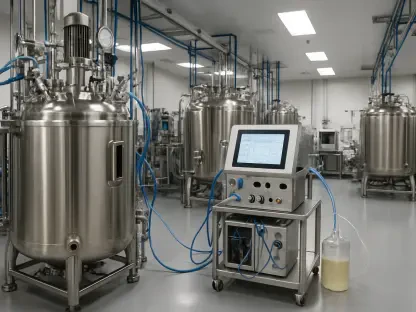The industrial automation sector is experiencing transformative shifts, driven by technological advancements, geopolitical dynamics, and a pressing demand for more intelligent manufacturing processes. Rockwell Automation (NYSE: ROK) stands at the forefront of this evolution, playing a pivotal role as industries navigate these changes. Recently, Bank of America (BofA) Securities upgraded Rockwell Automation to a “Buy” rating, signaling confidence in its strategic trajectory. Three key growth catalysts have been highlighted: an upswing in reshoring demand, progress in overcoming project delays, and a meticulous, strategic turnaround approach. These elements collectively position Rockwell Automation as a primary force benefiting from the ongoing industrial revival.
Reshoring and the Rise of U.S. Manufacturing
The U.S. government’s focus on bringing manufacturing back to domestic shores has presented a significant opportunity for Rockwell Automation, offering an estimated $250 billion market potential. This move addresses vulnerabilities in global supply chains and geopolitical tensions, reinforcing the importance of domestic manufacturing. Such initiatives, when coupled with a global surge in digital transformation, project an impressive organic revenue boost of 8% for Rockwell by 2026. At the core of leveraging this potential is Rockwell’s Logix platform, an advanced integration of industrial control systems and AI-driven software. This platform’s modular design allows for efficient, incremental upgrades to legacy systems, thereby optimizing productivity and minimizing operational downtime, contributing immensely to their reshoring strategy’s effectiveness.
Simultaneously, the reshoring movement has amplified the demand for Rockwell’s Lifecycle Services. These services provide crucial maintenance and optimization solutions tailored to Rockwell’s automation technologies, ensuring sustained performance and creating a steady stream of recurring revenue. Coupled with the scalable nature of its software portfolio, Rockwell is building a resilient, engaged customer base with high retention rates. Furthermore, BofA notes that despite macroeconomic pressures, the Software & Control division, Rockwell’s fastest-growing segment, has demonstrated exceptional pricing power. This division’s ability to outperform expectations reinforces confidence in Rockwell’s continued success in aligning with reshoring goals and contributes positively to its market stronghold.
Navigating Project Delays and Supply Chain Issues
One significant hurdle Rockwell Automation faces involves delays in large-scale projects, primarily attributed to trade policy uncertainties and supply chain bottlenecks. These issues impacted growth projections for 2025, threatening to slow momentum. However, BofA anticipates that 80% of these delayed projects will be brought to fruition by the close of the year, potentially unlocking an additional $150 million in revenue by 2026. Achieving this renewed impetus depends heavily on clarifying trade policies and enhancing supply chain resilience. Rockwell’s extensive customer base, which has a substantial 35% of revenue generated outside North America, provides a safeguard against risks in any single geopolitical region, thereby fortifying stability against global uncertainties.
Project closures are vital in fulfilling BofA’s expectation of an EPS of $13 by 2026, a figure that exceeds consensus estimates by 14%. This projection hinges on significant margin expansion, reaching 20.4%, surpassing industry counterparts. Support for this outlook is drawn from Rockwell’s historical performances, illustrated clearly with their Q1 2025 success of delivering $2.45 EPS despite a minor 2% revenue decline. Historically, Rockwell’s stock performance has consistently reacted positively to exceeded expectations, displaying a strong win rate that emphasizes confidence in short-term earnings potential and bolsters optimism for sustained investor interest.
Rockwell’s Position in Automation: Valuation and Market Dynamics
Rockwell Automation’s valuation, standing at 23x 2026 EV/EBITDA compared to the peer average of 16x, reflects its esteemed positioning within the automation software landscape. This elevated valuation is justified by its strategic positioning and market confidence, as highlighted by BofA, which suggests that market evaluations may overlook Rockwell’s capacity to surpass the targeted $150 million cost savings and further tap into the untapped potential of its digital offerings. With current shares trading near their 52-week high at $351, there is a discernible potential upside gap to BofA’s target price of $410, offering an opportunity within an atmosphere of market skepticism as captured by a “Moderate Buy” consensus rating.
However, BofA notes several risk factors, including volatility in trade policies that could hinder project signings, though Rockwell’s diversified footprint offers a buffer. Additionally, the strong dollar poses a risk to international revenues, though this may be mitigated by anticipated cost savings. Execution risks remain a consideration, requiring the completion of delayed projects by late 2025 to maintain investor confidence and momentum. Against this backdrop, Rockwell’s strategic priorities and growth outlook paint a promising picture for the future of its operations.
Future Prospects and Investor Implications
The industrial automation industry is undergoing significant shifts due to technological innovations, geopolitical factors, and the need for more intelligent manufacturing solutions. Rockwell Automation (NYSE: ROK) is at the helm of this changing landscape, playing a crucial role as industries adapt to these transformations. Bank of America (BofA) Securities has recently upgraded Rockwell Automation to a “Buy” rating, reflecting optimism about its strategic direction. Several factors are fueling this positive outlook: a rise in reshoring activities, progress in overcoming delays in projects, and a well-planned, strategic pivot. These factors position Rockwell Automation as a key player ready to capitalize on the ongoing industrial revival and technological evolution. The company’s proactive approach in adopting new technologies and its strategic foresight make it a leader that is likely to benefit significantly from the current trends and future advancements in industrial automation.









